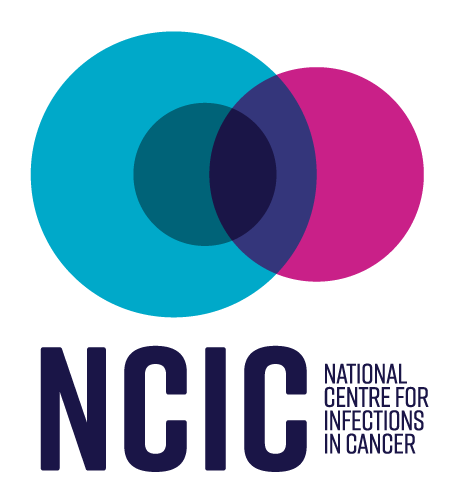2022 NCIC COVID-19 Symposium
Updates on COVID-19 in Immunocompromised Hosts
Genomic sequencing of SARS-CoV-2 for surveillance and clinical questions
Dr Norelle Sherry, MDU Public Health Laboratory, Doherty Institute
Navigating COVID19 in Your Impending Recipient or Impending Donor
Dr Cameron Wolfe, Duke University
SARS-CoV-2 Vaccines in Solid Organ Transplant Recipients: In Search of the Perfect Boost
Dr Andrew Karaba, John Hopkins University
Tixagevimab-Cilgavimab for the Prevention of COVID-19 in Immunocompromised Hosts
Dr William Werbel, John Hopkins University
2019 NCIC Symposium
New Frontiers: Managing Infections in Cancer
Instructions for play back: Start the audio to listen and open the slide pack to scroll through a PDF of the presentation.
Session 1: Implementation (Chair: Leon Worth)
Lisa Hall- How to implement programmatic change
Gabrielle Haeusler- Implementing a low risk program
Brendan McMullan- Implementing AMS in Paediatrics
Jason Trubiano-Implementing an allergy de-labelling clinic
Session 2: Diagnostics (Chair: Ben Teh)
Marc Pellegrini: CRISPR technology
Abby Douglas: Imaging for IFI
Sharon Chen: Fungal diagnostics and genomics for resistance
Session 3: Information (Chair: Kim Dalziel)
Karin Verspoor: NLP potential and the EMR
Jake Valentine: Advances in Surveillance
Michelle Tew: Health economic evaluation
Session 4: Future Proofing Care (Chair: Abby Douglas)
Michelle Yong: Precinct clinical trials addressing gaps
Julian Lindsay: Rates of infection in BMT
Belinda Lambros: Role of ID nurse practitioner
Your gut health consumer information forum
NCIC Special Seminar
Feb 2019. Prof Bob Finberg: “Influenza. Viral Evolution and the red Queen Hypothesis” Dr.
Robert Finberg is the Richard M. Haidack Professor and Chair of Medicine at the University of Massachusetts Medical School and UMass Memorial Health Care. His work has yielded notable advances, among them characterizing a major cellular receptor for viruses, the coxsackie and adenovirus receptor, and its role in picornavirus infection and gene delivery for adenovirus vectors as well as in cardiac development. His research on innate immunity defined the importance of “pattern recognition proteins,” including toll-like receptors, CD14 and helicases, in the virus-host interaction. He leads a multicenter study to predict the evolution of influenza viruses. His clinical expertise extends from prevention and primary care to treating severely immunocompromised patients. Dr. Finberg received his A.B. from the University of Chicago and his M.D. from Einstein (Alpha Omega Alpha, 1974). He then trained at Bellevue and Peter Bent Brigham Hospitals, followed by fellowships at Brigham and Harvard Medical School. He rose to be a professor of medicine at Harvard (M.A., 1996), and in 1999 he joined UMass as chair of the department of medicine. He has written more than 240 peer-reviewed journal articles and 65 book chapters. Dr. Finberg has chaired a National Institutes of Health study section and is a member of many academic societies, including the, American Society for Clinical Investigation and American Association of Physicians, and is an Academy Fellow of the American Society of Microbiology.
NCIC Journal Club
May 2019. Abby Douglas: S.argenteus: how is it different to S.aureus, and how should it change our management?
March 2019. Jake Valentine:Comparing the validity of different ICD coding abstraction strategies for sepsis case identification in German claims data. PLoS One. 2018 Jul 30;13(7):e0198847. doi: 10.1371/journal.pone.0198847. eCollection 2018.
Oct 2018. Jake Valentine: Centers for medicare and medicaid services hospital-acquired conditions policy for central line-associated bloodstream infection (CLABSI) and cather-associated urinary tract infection (CAUTI) shows minimal impact on hospital reimbursement. Infect Control Hosp Epidemiol. 2018 Aug;39(8):897-901. doi: 10.1017/ice.2018.137. Epub 2018 Jun 28.
Sept 2018. Victorian Madigan:Early Corticosteroids for Pneumocystis Pneumonia in Adults Without HIV Are Not Associated With Better Outcome.Chest 2018 Sep;154(3):636-644. doi: 10.1016/j.chest.2018.04.026. Epub 2018 Apr 26.
2018 NCIC workshop and Symposium
What’s new in Cancer: what ID needs to know
For more info on managing infections in cancer patients head over to our Information for providers page for all the latest guidelines and publications
Session 1. Opening and Keynote
Chair Prof Monica Slavin, NCIC, RMH and PMCC
09:00am Opening: Monica Slavin, Director NCIC
09:30am Keynote: Infectious Complications of CAR T cells, Dr Josh Hill, Fred Hutch
Session 2. Workshops: The changing landscape of cancer therapies and implications for ID
Chair Leon Worth, NCIC
11:00am HSCT, Dr Eric Wong, Austin Health (changing landscape in transplants) and Dr. Michelle Yong, NCIC (Implications for infections)
11:45am Small molecule inhibitors and targeted Abs, Dr Carrie Van Der Weyden, PMCC (changing landscape in cancer therapies) and Dr Ben Teh, NCIC (Implications for Infections)
Session 3. Symposium: New directions in cancer and ID
Chair Dr Gabrielle Haeusler,NCIC
1:30pm The microbiome: Implications for Infection and Immunity, Prof Geraint Rogers, SAHMRI
2:30pm Immune Checkpoint Inhibitors: Distinguishing adverse immune events from Infectious complications, Dr Shahneen Sandu, PMCC
3:00pm A new era in cancer therapy: what does it mean for ID? Panel discussion, moderator: Prof Karin Thursky, NCIC and NCAS



